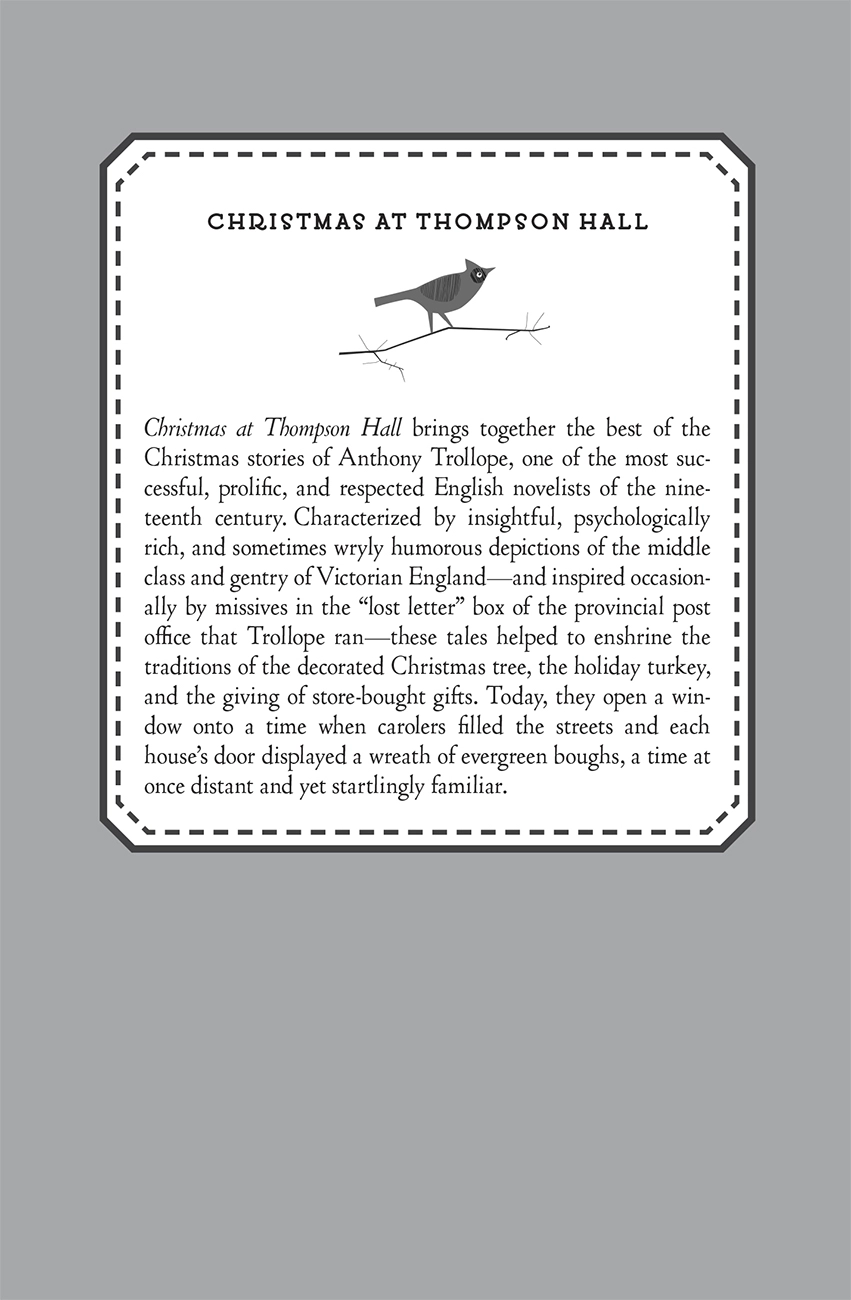Christmas at Thompson Hall


PENGUIN  CLASSICS
CLASSICS
CHRISTMAS AT THOMPSON HALL
Anthony Trollope (1815–82) was born in London. His father was a barrister who went bankrupt; the family was maintained by his mother, Frances, who resourcefully in later life became a bestselling writer. Trollope’s education was disjointed, and his childhood generally seems to have been an unhappy one. Trollope enjoyed considerable acclaim as a novelist during his lifetime, publishing more than forty novels and many short stories, at the same time following a notable career as a civil servant in the British Postal Service. The Warden (1855), the first of his novels to achieve success, was followed by the sequence of “Barsetshire” novels, Barchester Towers (1857), Doctor Thorne (1858), Framley Parsonage (1861), The Small House at Allington (1864), and The Last Chronicle of Barset (1867). This series, regarded by some as his masterpiece, demonstrates Trollope’s imaginative grasp of the great preoccupation of eighteenth- and nineteenth-century English novels—property—and features a gallery of recurring characters, among them the worldly cleric, Archdeacon Grantly; the immortal Mrs. Proudie; and the saintly warden, Septimus Harding. Almost equally popular were Trollope’s six Palliser novels, comprising Can You Forgive Her? (1865), Phineas Finn (1869), The Eustace Diamonds (1873), Phineas Redux (1874), The Prime Minister (1876), and The Duke’s Children (1880). Among his other novels are He Knew He Was Right (1869) and The Way We Live Now (1875), each regarded by some as among the greatest of nineteeth-century fiction.


BookishMall.com
Published by the Penguin Group
Penguin Group (USA) LLC
375 Hudson Street
New York, New York 10014

USA | Canada | UK | Ireland | Australia New Zealand | India | South Africa | China
penguin.com
A Penguin Random House Company
This edition published in Penguin Books 2014
Penguin supports copyright. Copyright fuels creativity, encourages diverse voices, promotes free speech, and creates a vibrant culture. Thank you for buying an authorized edition of this book and for complying with copyright laws by not reproducing, scanning, or distributing any part of it in any form without permission. You are supporting writers and allowing Penguin to continue to publish books for every reader.
LIBRARY OF CONGRESS CATALOGING-IN-PUBLICATION DATA
Trollope, Anthony, 1815–1882.
[Short stories. Selections]
Christmas at Thompson Hall, and other Christmas stories / Anthony Trollope.
pages cm–(Penguin classics)
eBook ISBN 978-0-698-17090-2
1. Christmas stories, English. I. Title.
PR5682 2014
823'.8—dc23
Version_1

Contents
About the Author
Title Page
Copyright
Christmas at Thompson Hall
Christmas Day at Kirkby Cottage
The Mistletoe Bough
The Two Generals
Not If I Know It

Christmas at Thompson Hall
MRS. BROWN’S SUCCESS
Everyone remembers the severity of the Christmas of 187-. I will not designate the year more closely, lest I should enable those who are too curious to investigate the circumstances of this story, and inquire into details which I do not intend to make known. That winter, however, was especially severe, and the cold of the last ten days of December was more felt, I think, in Paris than in any part of England. It may, indeed, be doubted whether there is any town in any country in which thoroughly bad weather is more afflicting than in the French capital. Snow and hail seem to be colder there, and fires certainly are less warm, than in London. And then there is a feeling among visitors to Paris that Paris ought to be gay; that gaiety, prettiness, and liveliness are its aims, as money, commerce, and general business are the aims of London, — which with its outside sombre darkness does often seem to want an excuse for its ugliness. But on this occasion, at this Christmas of 187-, Paris was neither gay nor pretty nor lively. You could not walk the streets without being ankle deep, not in snow, but in snow that had just become slush; and there were falling throughout the day and night of the 23rd of December a succession of damp half-frozen abominations from the sky which made it almost impossible for men and women to go about their business.
It was at ten o’clock on that evening that an English lady and gentleman arrived at the Grand Hotel on the Boulevard des Italiens. As I have reasons for concealing the names of this married couple I will call them Mr. and Mrs. Brown. Now I wish it to be understood that in all the general affairs of life this gentleman and this lady lived happily together, with all the amenities which should bind a husband and a wife. Mrs.
1 comment